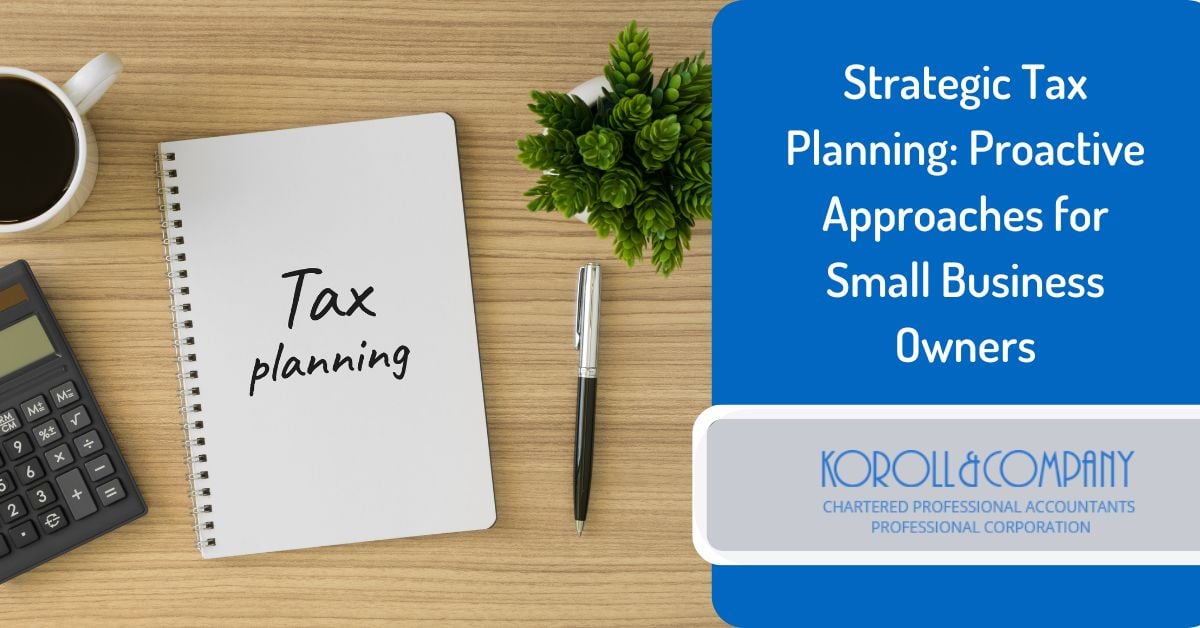 Tax planning is a crucial aspect of running a successful small business. By employing strategic tax planning techniques, small business owners can optimize their tax liabilities, reduce financial burdens, and ultimately improve their bottom line.
Tax planning is a crucial aspect of running a successful small business. By employing strategic tax planning techniques, small business owners can optimize their tax liabilities, reduce financial burdens, and ultimately improve their bottom line.
Today, we’ll explore some proactive steps that you can take to help navigate the complex world of taxes, ensuring compliance while maximizing their financial resources.
1. Stay Informed: Understand the Tax Landscape
Tax laws and regulations are subject to constant changes and updates. As a small business owner, it’s essential to stay informed about any modifications in the tax landscape that may affect your business.
Consult with a trusted tax professional and leverage reliable online resources to stay updated on tax laws and regulations, as well as deductions, credits, grants, and other benefits that are relevant to your industry and business structure.
2. Classify Expenses Correctly: Know the Difference
Properly classifying business expenses is a fundamental aspect of strategic tax planning. That’s because different expenses may be subject to varying tax treatment.
Familiarize yourself with the distinctions between deductible, capital, and personal expenses to ensure accurate reporting. By correctly categorizing expenses, you can maximize deductions, minimize taxable income, and potentially reduce your overall tax liability.
3. Take Advantage of Tax Deductions and Credits
Tax deductions and credits are powerful tools that can significantly impact your tax liability. Identify all applicable deductions and credits for your small business. Common deductions include business-related expenses such as office supplies, travel expenses, and employee salaries.
Additionally, explore tax credits, such as research and development credits or hiring incentives, that may be available to your business. Take full advantage of these opportunities to optimize your tax position.
4. Plan Your Business Structure: Choose Wisely
The structure of your business - whether it's a sole proprietorship, partnership, or corporation - can have significant implications for taxation. That’s because different business structures are subject to varying tax rates and regulations.
Before starting your business, consult with a tax advisor to determine the most advantageous structure for your specific circumstances, considering factors such as liability protection, ease of administration, and tax implications.
5. Embrace Retirement Savings Plans
Small business owners often overlook the benefits of retirement savings plans as a tax planning strategy. Contributions made to retirement plans can reduce taxable income while simultaneously securing your financial future.
Investigate these options to determine which retirement savings strategy aligns best with your business goals and long-term objectives.
6. Leverage Timing Strategies: Deferring or Accelerating Income
Timing can be a powerful ally when it comes to tax planning. Consider deferring income to future tax years or accelerating deductible expenses into the current year to optimize your tax situation.
By strategically timing your business transactions, you can potentially control your taxable income and deductions, ensuring that they fall in the most advantageous tax year.
7. Seek Professional Assistance: Work With a Tax Advisor
Navigating the complexities of tax planning can be challenging for small business owners.
Engaging the services of a qualified tax advisor can provide invaluable guidance and expertise. A knowledgeable tax professional can help you identify opportunities, minimize risks, and ensure compliance with tax laws, allowing you to focus on growing your business with peace of mind.
Taking the Time to Plan Can Improve Your Bottom Line
Strategic tax planning is an essential aspect of small business ownership. By staying informed, leveraging resources, employing timing strategies, and seeking professional assistance, small business owners can proactively manage their tax liabilities.
Taking a proactive approach to tax planning not only ensures compliance but also optimizes your financial resources, ultimately contributing to the long-term success and growth of your business.
Need help? Contact Koroll & Company’s team of chartered professional accountants today.






